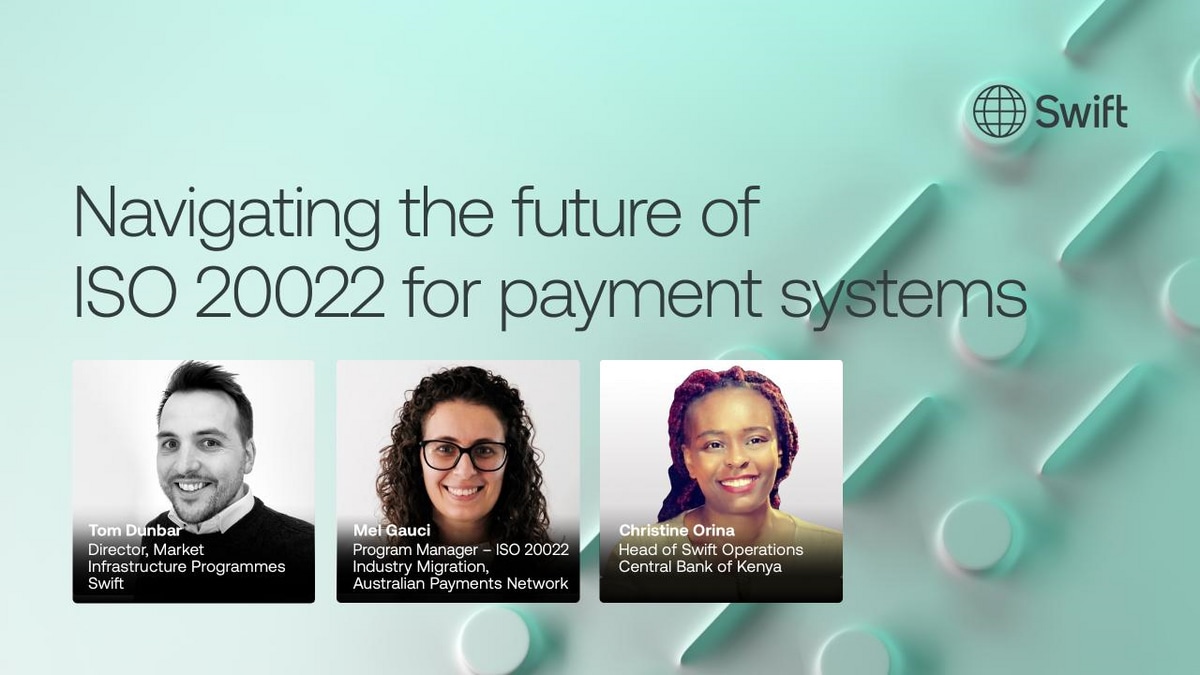With 18 months to go until the end of the coexistence period, the daily average number of CBPR+ messages exchanged now exceeds one million.
Following the steady progress, at its March 2024 meeting, the Swift Board re-confirmed the community’s commitment to November 2025 as the end of the MT/ISO 20022 cross-border coexistence period, emphasising that priority should be given to instruction messages to ensure operational continuity and ongoing interoperability.
Focus on instructions
Amongst the various message types in scope of migration, Swift, at the request of the community and with the support of the Board, proposes that priority be given to instructions.
This is because the use of ISO 20022 cross-border instructions is necessary to enable end-to-end interoperability between financial institutions (FIs) and between FIs and Payments Market Infrastructures (PMIs). For compliance reasons, it is important to ensure that data – particularly related to payment parties – is not lost or truncated along the end-to-end processing chain. This cannot be guaranteed if a transaction that originates in ISO 20022 is converted to the less rich MT standard as part of its cross-border journey.
Following strong feedback from National Member Groups and the Core Payments Working Group that we should enable members to focus on instructions, other FIN/MT message types in the scope of the migration, including reporting/statements, will not be withdrawn from the FIN service immediately in November 2025. These message types are deprecated, meaning they are no longer maintained by Swift, and disincentives will be introduced at a later date, so FIs are strongly advised to switch to their ISO 20022 equivalents as soon as possible.
For more information, please refer to Knowledge Base article 6000054.
Introducing new CBPR+ webinars
We’ve launched a new series of monthly webinars that highlight the advantages of ISO 20022 and provide financial institutions with actionable steps for embracing CBPR+ adoption! We’d like to encourage all financial institutions to register for the upcoming sessions and to invite colleagues and customers to join as well. Recordings of the sessions will also be accessible shortly on Swift Smart.
Join our latest LinkedIn Live: Navigating the future of ISO 20022 for payment systems
Register now to explore the transformative journey that ISO 20022 offers for the future of payment systems around the world.
Swift’s Market Infrastructure Programmes Lead, Tom Dunbar, will be joined by Mel Gauci from the Australian Payments Network (AusPayNet), and Christine Orina from the Central Bank of Kenya to discuss how ISO 20022 can bolster financial stability and innovation.
Join us as we deep dive into the status of the current landscape and uncover the pivotal role payment systems and central banks play in driving meaningful real-world change through ISO 20022.
ISO 20022: Expanding adoption in domestic markets
ISO 20022 is gaining momentum domestically, with the US (CHIPS) and Hong Kong (CHATS) leading the news in April.
Here’s a snapshot of ISO 20022’s journey on Swift:
- Currently, 18 payment market infrastructures (PMIs) are operational with ISO 20022 on Swift, with a coexistence strategy in place for five of them.
- This year marked the successful ISO 20022 go-live in Romania, Macau, and Sri Lanka, using the ISO Accelerator Pack.
- Looking ahead, we anticipate 15 more PMIs to join global ISO 20022 adoption later in 2024.
Stay informed and prepared as we continue to embrace the new global standard across more domestic markets.
Streamlining ISO 20022 adoption: A unified approach
The ISO 20022 Payments Interoperability Charter was established by the HVPS+ market practice group to create shared goals and principles to ensure harmonised adoption and guaranteed interoperability of ISO 20022.
To date, numerous Market Infrastructures have pledged support for the charter, with various industry groups and organisations having endorsed its principles. For detailed insights on the charter and its change management process, please visit the HVPS+ website.
To take advantage of this harmonisation, Swift’s ISO Accelerator Pack is aligned with the HVPS+ principles and usage guidelines, as well as the CBPR+ usage guidelines, and so is an attractive, effective, and efficient solution for Market Infrastructures adopting the new standard around the world.
Discover more about the ISO Accelerator Pack here.
Harnessing the benefits of richer, more structured data
The Payments Market Practice Group (PMPG) has released a collection of Market Guidance papers, designed to assist the community in leveraging rich and structured data elements more effectively.
The new guidelines give insights on ultimate parties, structured remittance information, regulatory reporting, and the announcement of the new hybrid postal address option.
As the PMPG highlighted, “A new hybrid postal address option will be introduced as of November 2025 in Swift and leading Payment Market Infrastructures. The hybrid address allows simultaneous usage of structured and unstructured elements, with a minimum of structured Town Name and Country.”
This decision aims to smoothen the implementation process while improving data quality globally, by ensuring that fully structured, hybrid, or fully unstructured postal addresses may be used during a one-year grace period from November 2025 to November 2026.
While, after this period, the fully unstructured postal address option will be retired, ensuring all addresses adhere to a standardised format.
To stay current with PMPG’s ongoing publications and guidance, why not follow them on LinkedIn or by visiting the PMPG website for all of the latest updates?
The latest CBPR+ news: New developments and future preparations
Exciting advancements are on the horizon for CBPR+ with the introduction of two new messages in camt.105 (charges notification) and camt.106 (charges request).
These will be available for testing on the FINplus Pilot Future service starting in July, with a live implementation slated for November. To support these developments, a suite of resources is available on MyStandards, including the Usage Guidelines, the CBPR+ User Handbook and the Readiness Portal, so please check them out.
In preparation for the Standards Release 2025, the CBPR+ working group is also drafting new Usage Guidelines for the camt.025 (“receipt”) and admi.024 (“correspondence”) messages. These guidelines are anticipated to be available by the end of 2024 and mark another important milestone in the evolution of CBPR+ standards.
Enhancing communication between banks and corporates
In pursuit of our strategy for instant and frictionless transactions, we’re enhancing our Standardised Corporate Environment (SCORE), which facilitates communication between banks and corporates.
We’re currently developing capabilities to capture richer data at the source, validate it, and ensure its seamless end-to-end transfer. And will be providing Financial Institutions (FIs) with the services and tools necessary to provide one standardised experience for their corporate customers by creating an end-to-end ISO 20022 standard.
Added to this, we’re also working on enabling FIs to offer consistent payment tracking data experiences across their corporate customer base, irrespective of their geographical presence or local investments.
For further details, please refer to our recent announcement and FAQs. You can also access recordings of our latest webinars on SwiftSmart and stay updated by visiting our support page on the Knowledge Centre.
Evolving Case Management with more structured data
Case Management is set to enhance the handling of exceptions and investigations by replacing unstructured MT messages with a centralised service.
This new approach will utilise structured ISO 20022 messages, an API, or a GUI for updates and access.
The pilot programme, which commenced in January, has participation from 32 banks and 5 solution providers. These participants will engage in various testing phases throughout Q2, Q3, and Q4 of 2024, with the solution slated for general availability in November 2024.
Comprehensive Usage Guidelines are accessible on MyStandards, and the rulebook is available upon request. For additional information, refer to Knowledge Base article 5026406. We’ll continue to keep you up to date as this initiative marks a significant step towards more streamlined and efficient case management processes.
Streamlining payment initiation with the Relay Rulebook
Financial institutions currently using MT 101 for relaying customer payments need to transition to the pain.001 interbank relay on FINplus. This process be completed by the end of the coexistence period in November 2025.
To demonstrate your readiness, you can inform counterparties of your readiness by acceding to the ISO 20022 Rulebook for Payment Initiation Relay in 3 easy steps:
- Update your swift.com personal profile through MySwift to request ‘Ordering’ rights, or work with a colleague who possesses the appropriate access.
- Use the eForm to accede to the Rulebook, where you can select your BIC, publication date, and the role of the agent, whether as a Forwarding Agent and/or Debtor Agent.
- Inform your counterparties of your readiness through the dedicated SwiftRef directory.
Following this process will ensure a smooth transition. For detailed guidance, please refer to Knowledge Base article 5026117.
[Ebook] Supercharge your payments business with ISO 20022
Leading financial institutions share insights on the concrete benefits opened up by ISO 20022’s rich, structured data capabilities.



